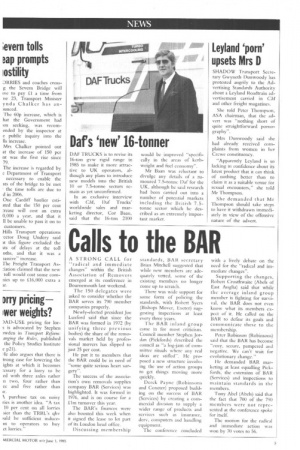Calls to the BAR
Page 7

If you've noticed an error in this article please click here to report it so we can fix it.
A STRONG CALL for "radical and immediate changes" within the British Association of Removers emerged at its conference in Bournemouth last weekend.
The 150 delegates were asked to consider whether the BAR serves its 790 member companies properly.
Newly-elected president Joe Luxford said that since the BAR was formed in 1972 (by unifying three previous bodies) the share of the removals market held by professional movers has slipped to just 25 per cent.
He put it to members that the BAR could be in need of "some quite serious heart surgery".
The success of the association's own removals supplies company BAR (Services) was highlighted. It was formed in 1976, and is on course for a i".1m turnover this year.
The BAR's finances were also boosted this week when it signed the lease to let part of its London head office.
Discussing membership standards, BAR secretary Brian Mitchell suggested that while new members are adequately vetted, some of the existing members no longer conic up to scratch.
There was wide support for some form of policing the standards, with Robert Sycrs (Bishops Mover, Exeter) suggesting inspections at least every three years.
The BAR inland group came in for most criticism. Council member Stephen Jordan (Pickfords) described the council as "a log-jam of committee rituals where any real ideas are stifled". He proposed a new structure involving the use of action groups to get things moving more quickly.
Derck Payne (Robinsons and Coxeter) proposed building on the success of BAR (Services) by creating a commercial division to supply a wider range of products and services such as insurance, derv, computers and handling equipment.
The conference concluded with a lively debate on the need for the "radical and immediate changes".
Supporting the changes, Robert Crosthwaite (Abels of East Anglia) said that while the average inland group member is fighting for survival, the BAR does not even know what its members expect of it. He called on the BAR to define its goals and communicate these to the membership.
Peter Robinson (Robinsons) said that the BAR has become "cosy, secure, pampered and negative. We can't wait for evolutionary change."
He demanded BAR marketing at least equalling Pickfords, the extension of BAR (Services) and inspections to maintain standards in the members.
Tony Abel (Abels) said that the fact that 700 of the 790 members were not represented at the conference spoke for itself.
The motion for the radical and immediate action was won by 70 votes to 56.




















































































